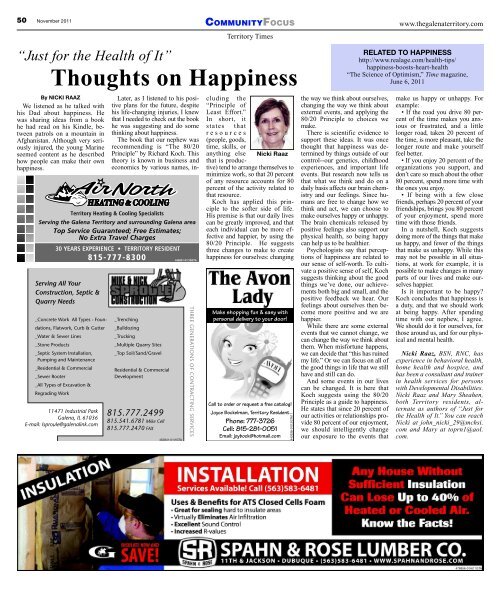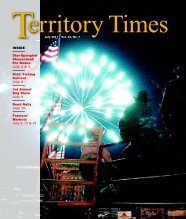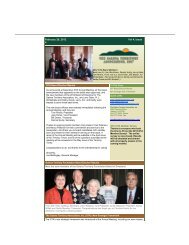November 2011 - The Galena Territory
November 2011 - The Galena Territory
November 2011 - The Galena Territory
Create successful ePaper yourself
Turn your PDF publications into a flip-book with our unique Google optimized e-Paper software.
50 <strong>November</strong> <strong>2011</strong> COMMUNITYFOCUS<br />
Serving All Your<br />
Construction, Septic &<br />
Quarry Needs<br />
_Concrete Work All Types - Foundations,<br />
Flatwork, Curb & Gutter<br />
_Water & Sewer Lines<br />
_Stone Products<br />
_Septic System Installation,<br />
Pumping and Maintenance<br />
_Residential & Commercial<br />
_Sewer Rooter<br />
_All Types of Excavation &<br />
Regrading Work<br />
11471 Industrial Park<br />
<strong>Galena</strong>, IL 61036<br />
E-mail: lsproule@galenalink.com<br />
<strong>Territory</strong> Heating & Cooling Specialists<br />
Serving the <strong>Galena</strong> <strong>Territory</strong> and surrounding <strong>Galena</strong> area<br />
Top Service Guaranteed; Free Estimates;<br />
No Extra Travel Charges<br />
30 YEARS EXPERIENCE • TERRITORY RESIDENT<br />
815-777-8300<br />
_Trenching<br />
_Bulldozing<br />
_Trucking<br />
_Multiple Quarry Sites<br />
_Top Soil/Sand/Gravel<br />
Residential & Commercial<br />
Development<br />
815.777.2499<br />
815.541.6781 Mike Cell<br />
815.777.2470 FAX<br />
452841-01(1GTA<br />
442631-01(12GTA<br />
THREE GENERATIONS OF CONTRACTING SERVICES<br />
<strong>Territory</strong> Times<br />
“Just for the Health of It”<br />
Thoughts on Happiness<br />
By NICKI RAAZ<br />
We listened as he talked with<br />
his Dad about happiness. He<br />
was sharing ideas from a book<br />
he had read on his Kindle, between<br />
patrols on a mountain in<br />
Afghanistan. Although very seriously<br />
injured, the young Marine<br />
seemed content as he described<br />
how people can make their own<br />
happiness.<br />
Later, as I listened to his positive<br />
plans for the future, despite<br />
his life-changing injuries, I knew<br />
that I needed to check out the book<br />
he was suggesting and do some<br />
thinking about happiness.<br />
<strong>The</strong> book that our nephew was<br />
recommending is “<strong>The</strong> 80/20<br />
Principle” by Richard Koch. This<br />
theory is known in business and<br />
economics by various names, in-<br />
cluding the<br />
“Principle of<br />
Least Effort.”<br />
In short, it<br />
states that<br />
r e s o u r c e s<br />
(people, goods,<br />
time, skills, or<br />
anything else Nicki Raaz<br />
that is productive)<br />
tend to arrange themselves to<br />
minimize work, so that 20 percent<br />
of any resource accounts for 80<br />
percent of the activity related to<br />
that resource.<br />
Koch has applied this principle<br />
to the softer side of life.<br />
His premise is that our daily lives<br />
can be greatly improved, and that<br />
each individual can be more effective<br />
and happier, by using the<br />
80/20 Principle. He suggests<br />
three changes to make to create<br />
happiness for ourselves: changing<br />
Make shopping fun & easy with<br />
personal delivery to your door!<br />
Call to order or request a free catalog!<br />
Joyce Bockelman, <strong>Territory</strong> Resident<br />
Phone: 777-3726<br />
Cell: 815-281-0051<br />
Email: joybock@hotmail.com<br />
442638-01(12GTA11<br />
the way we think about ourselves,<br />
changing the way we think about<br />
external events, and applying the<br />
80/20 Principle to choices we<br />
make.<br />
<strong>The</strong>re is scientific evidence to<br />
support these ideas. It was once<br />
thought that happiness was determined<br />
by things outside of our<br />
control--our genetics, childhood<br />
experiences, and important life<br />
events. But research now tells us<br />
that what we think and do on a<br />
daily basis affects our brain chemistry<br />
and our feelings. Since humans<br />
are free to change how we<br />
think and act, we can choose to<br />
make ourselves happy or unhappy.<br />
<strong>The</strong> brain chemicals released by<br />
positive feelings also support our<br />
physical health, so being happy<br />
can help us to be healthier.<br />
Psychologists say that perceptions<br />
of happiness are related to<br />
our sense of self-worth. To cultivate<br />
a positive sense of self, Koch<br />
suggests thinking about the good<br />
things we’ve done, our achievements<br />
both big and small, and the<br />
positive feedback we hear. Our<br />
feelings about ourselves then become<br />
more positive and we are<br />
happier.<br />
While there are some external<br />
events that we cannot change, we<br />
can change the way we think about<br />
them. When misfortune happens,<br />
we can decide that “this has ruined<br />
my life.” Or we can focus on all of<br />
the good things in life that we still<br />
have and still can do.<br />
And some events in our lives<br />
can be changed. It is here that<br />
Koch suggests using the 80/20<br />
Principle as a guide to happiness.<br />
He states that since 20 percent of<br />
our activities or relationships provide<br />
80 percent of our enjoyment,<br />
we should intelligently change<br />
our exposure to the events that<br />
www.thegalenaterritory.com<br />
RELATED TO HAPPINESS<br />
http://www.realage.com/health-tips/<br />
happiness-boosts-heart-health<br />
“<strong>The</strong> Science of Optimism,” Time magazine,<br />
June 6, <strong>2011</strong><br />
make us happy or unhappy. For<br />
example:<br />
• If the road you drive 80 percent<br />
of the time makes you anxious<br />
or frustrated, and a little<br />
longer road, taken 20 percent of<br />
the time, is more pleasant, take the<br />
longer route and make yourself<br />
feel better.<br />
• If you enjoy 20 percent of the<br />
organizations you support, and<br />
don’t care so much about the other<br />
80 percent, spend more time with<br />
the ones you enjoy.<br />
• If being with a few close<br />
friends, perhaps 20 percent of your<br />
friendships, brings you 80 percent<br />
of your enjoyment, spend more<br />
time with those friends.<br />
In a nutshell, Koch suggests<br />
doing more of the things that make<br />
us happy, and fewer of the things<br />
that make us unhappy. While this<br />
may not be possible in all situations,<br />
at work for example, it is<br />
possible to make changes in many<br />
parts of our lives and make ourselves<br />
happier.<br />
Is it important to be happy?<br />
Koch concludes that happiness is<br />
a duty, and that we should work<br />
at being happy. After spending<br />
time with our nephew, I agree.<br />
We should do it for ourselves, for<br />
those around us, and for our physical<br />
and mental health.<br />
Nicki Raaz, BSN, RNC, has<br />
experience in behavioral health,<br />
home health and hospice, and<br />
has been a consultant and trainer<br />
in health services for persons<br />
with Developmental Disabilities.<br />
Nicki Raaz and Mary Sheahen,<br />
both <strong>Territory</strong> residents, alternate<br />
as authors of “Just for<br />
the Health of It.” You can reach<br />
Nicki at john_nicki_29@mchsi.<br />
com and Mary at toprn1@aol.<br />
com.<br />
478856-01A(11GTA







